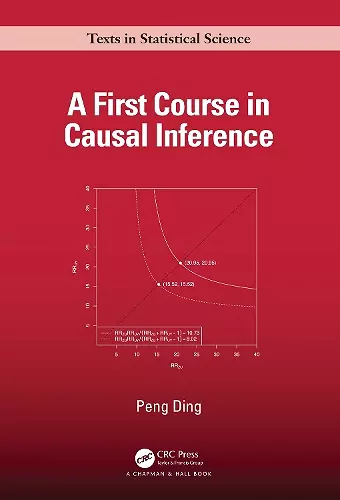A First Course in Causal Inference
Format:Hardback
Publisher:Taylor & Francis Ltd
Published:31st Jul '24
Currently unavailable, and unfortunately no date known when it will be back

The past decade has witnessed an explosion of interest in research and education in causal inference, due to its wide applications in biomedical research, social sciences, artificial intelligence etc. This textbook, based on the author's course on causal inference at UC Berkeley taught over the past seven years, only requires basic knowledge of probability theory, statistical inference, and linear and logistic regressions. It assumes minimal knowledge of causal inference, and reviews basic probability and statistics in the appendix. It covers causal inference from a statistical perspective and includes examples and applications from biostatistics and econometrics.
Key Features:
- All R code and data sets available at Harvard Dataverse.
- Solutions manual available for instructors.
- Includes over 100 exercises.
This book is suitable for an advanced undergraduate or graduate-level course on causal inference, or postgraduate and PhD-level course in statistics and biostatistics departments.
"This book offers a statistician’s perspective on causal inference. It provides an invaluable review of statistical paradoxes in causal inference from observational data, linking those paradoxes to Pearl’s directed acyclic graphs (DAGs). The overview of the literature on matching is the best that I’ve seen, and the inclusion of R code is a huge plus. The book would make a great introduction (and more) to advanced undergraduate and masters programs in statistics."
Professor Bryan Dowd, University of Minneapolis, U.S.A.
"A First Course in Causal Inference by Peng Ding is written by an authority in the field at technical level that makes it stand out from existing textbooks on causal inference. It will be a welcome resource for students and researchers in public health, medicine, and the social sciences who have a good background in math and statistics. Exercises lead readers through important results, appendices review key mathematical and statistical concepts, and the book contains well-written R code that will be extremely useful for translating theory into practice."
Professor Eben Kenah, The Ohio State University, U.S.A.
"Professor Ding accomplished something impressive with this book — a clear, precise, and thorough introduction to Causal Inference. This book is a must-have for anyone interested in understanding the subject. I highly recommend it."
Professor Hugo Jales, Syracuse University, Maxwell School of Citizenship & Public Affairs, USA.
ISBN: 9781032758626
Dimensions: unknown
Weight: 852g
422 pages